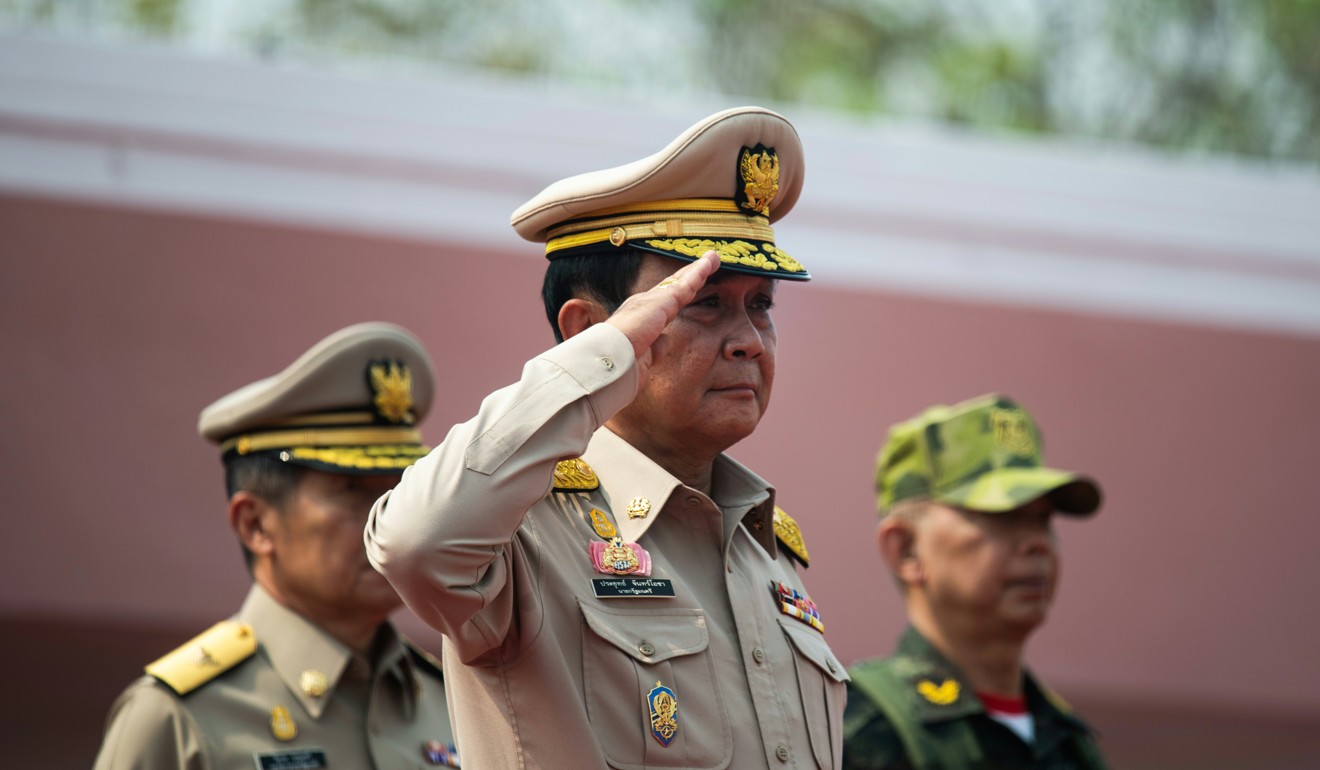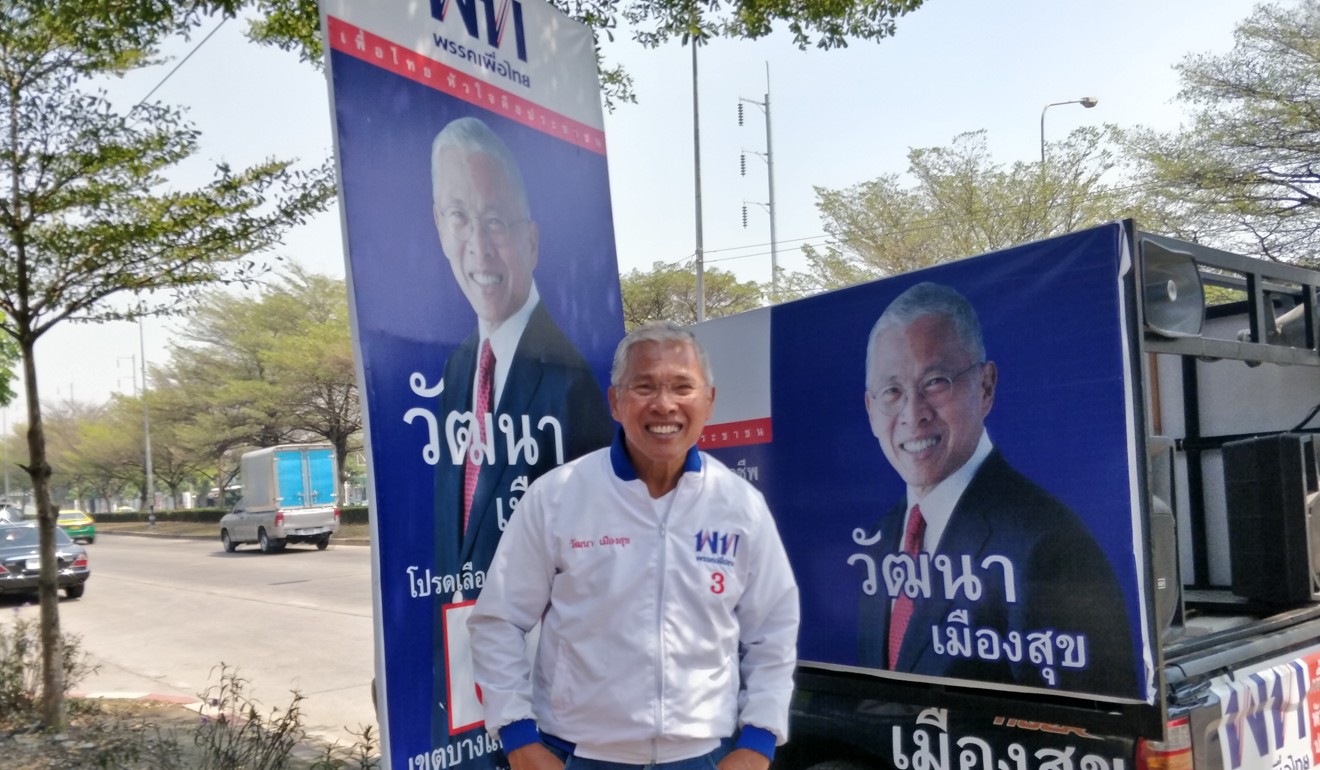How do Thailand’s pro-democracy parties beat the junta? Together, says Pheu Thai’s Watana Muangsook
- Thaksin Shinawatra’s confidante, contesting a Bangkok district in the March 24 polls, says the lack of a formal alliance should not prevent a concerted effort to end coup leader Prayuth Chan-ocha’s stint as prime minister

The disparate “pro-democracy” parties contesting Thailand’s March 24 election must forge a common cause to trounce the military-backed Palang Pracharat Party and end coup leader Prayuth Chan-ocha’s stint as prime minister, according to a close confidante of the junta’s exiled arch-foe Thaksin Shinawatra.
In an interview with the South China Morning Post, Watana Muangsook said while his Pheu Thai Party and others such as the Future Forward, Bhumjaithai and Seri Ruam Thai parties did not yet have a formal alliance, that should not hinder them from going all out to end Prayuth’s stint as premier.
Prayuth seized power in a 2014 coup – Thailand’s 12th in 82 years, and the second against a government backed by the influential but polarising Shinawatra clan after a putsch in 2006.
“To normalise our politics, we must kick out the dictatorship first. After that, we [pro-democratic parties] can talk about working together,” said Watana, who, like Thaksin, is among the junta’s most reviled opponents.
He is contesting Bangkok’s Bang Khae district and spoke to the Post on Tuesday at his campaign operations centre there.
Watana’s comments come as concern rises over whether the Democrat Party – the country’s second biggest party – will tie-up with Palang Pracharat, which would in effect keep the current military rulers in power.
For now, Democrat Party leader Abhisit Vejjajiva – a former premier himself and another of Thaksin’s nemeses – has insisted he will not back Prayuth.
Prayuth is not contesting the polls but is the preferred prime ministerial candidate of Palang Pracharat.
Analysts say the pro-junta party is well aware it cannot outdo the largely popular Pheu Thai in the polls. Its plan instead is to assemble an alliance of about 126 lawmakers in the 500-seat lower house.
With those MPs and the backing of the 250-seat senate – which is filled with junta appointees – Palang Pracharat is expected to have the crucial simple majority in both houses needed to appoint Prayuth as the post-election premier. Watana, however, said he did not buy this projection.
“I don’t think the 250 senators will dare to go against the people to support Prayuth if Palang Pracharat loses badly,” the veteran politician said. “So the most important thing is that we make sure they lose badly. We must kick their a**es.”
The former cabinet minister said his most optimistic projection was for Pheu Thai – the biggest of several Shinawatra-linked parties – to win around 180 seats. Winning a block of 250 seats with other parties firmly opposed to the junta would be highly possible, Watana said.
“If we get 250, that is a clear sign that people support us, not the dictatorship.”

While there has been some hand-wringing in his camp over the dissolution last week of Thai Raksa Chart, another party in his bloc, Watana said the fallout was unlikely to be as extensive as made out by commentators.
The party was dissolved by the country’s apex court over its controversial decision to appoint Princess Ubolratana Rajakanya as its prime ministerial candidate, a move ruled to be an affront to election rules that demand parties keep royals out of campaigning.
With his party not contesting in seats where Thai Raksa Chart was to have contested, Watana said the Future Forward Party led by the popular auto-parts billionaire Thanathorn Juangroongruangkit was likely to benefit.
Watana – who is among the handful of Pheu Thai figures who continued lambasting the military when it ordered the suspension of “political activity” following its May 2014 coup – is viewed domestically as one of Prayuth’s most vocal critics.
He is currently facing corruption charges – which he says are trumped up – and is barred from leaving the country without special permission. He was briefly detained in 2016 over scathing anti-junta Facebook posts.
His close ties with Thaksin, meanwhile, are also viewed as a key reason he has been in the junta’s crosshairs more than other party colleagues.

“I have come too far … It’s better to fight like a lion than to die like a dog,” Watana said, when asked whether he feared a post-election crackdown.
He was also candid when asked about Thaksin, the exiled former prime minister who is the singular force behind Thailand’s past two decades of political turmoil.
The military says it stepped in to oust the Thaksin government in 2006, and subsequently his sister Yingluck’s administration in 2014, because the Shinawatras at their core are corrupt and disruptive to social order. The Shinawatras, however, have the backing of the rural poor, especially in the country’s northeast.
While most Thai politicians demur when asked about the exiled Thaksin for fear of being disqualified, Watana said he had no reason to be coy about his loyalty to the ex-premier.
Thaksin is considered a fugitive in Thailand because he has not returned home to face multiple corruption and abuse of power cases against him.
The 69-year-old says he is innocent but will not return because he is unlikely to be exonerated by the courts while the junta is in power.
Asked if he hoped for Thaksin’s return, Watana said: “Certainly. I think more than half of the people want him to come back. The law and the procedure that was used [against] him are against the rule of law.”